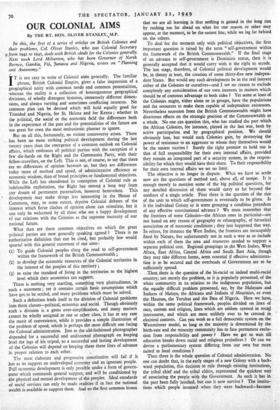OUR COLONIAL AIMS
By THE RT. HON. OLIVER STANLEY,.M.P.
In this, the first of a series of articles on British Colonies and their problems, Col. Oliver Stanley, who was Colonial Secretary from 1942 to 1945, deals with British ideals for the Colonies generally. Next week Lord Milverton, who has been Governor of North Borneo, Gambia, Fiji, Jamaica and Nigeria, writes on " Planning and Autonomy."
IT is not easy to write of Colonial aims generally. The familiar phrase, British Colonial Empire, gives a false impression of a geographical unity with common needs and common potentialities, whereas the reality is a collection of heterogeneous geographical divisions, of wholly divergent histories, immensely different dimen- sions, and always varying and sometimes conflicting interests. No common plan can be devised which will hold equally good for Trinidad and Nigeria, for St. Helena and for Kenya ; whether in the political, the social or the economic field the differences both in the experience of the past and the potentialities of the future are too great for even the most enthusiastic planner to ignore.
But on all this, fortunately, no violent controversy arises. There has been no more striking political development during the last twenty years than the emergence of a common outlook on Colonial affairs, which embraces all political parties with the exception of a few die-hards on the Right and the Communist Party, with their fellow-travellers, on the Left This is not, of course, to say that there are no differences of opinion between us, but they are differences today more of method and speed, of administrative efficiency or economic wisdom, than of broad principles or fundamental objectives. While the Left has abandoned its conception of Colonial rule as indefensible exploitation, the Right has moved a long way from any dream of permanent paternalism, however benevolent. This development may make things less interesting in the House of Commons, may, to some extent, deprive Colonial debates of the interest which fierce clashes of opinion alone can stimulate, but it can only be welcomed by all those who see a happy development of our relations with the Colonies as the supreme necessity of our national future.
What then are these common objectives on which the great political parties are now generally speaking agreed ? There is no authoritative definition that can be cited, but probably few would quarrel with this general statement of our aims : (t) To guide Colonial peoples along the road to self-government within the framework of the British Commonwealth ; (2) to develop the economic resources of the Colonial territories in the interest of the peoples of this territory ; (3) to raise the standard of living in the territories to the highest level which their economics can support.
There is nothing very startling, something very platitudinous, in such a statement ; yet it contains certain basic assumptions which have got. to be settled, and many problems which must be solved.
Such a definition lends itself to the division of Colonial problems into three classes—political, economic and social. Though obviously such a division is a gross over-simplification, and many matters cannot be wholly assigned to one or other class, it has at any rate the merit of convenience, while it provides a simple illustration of the problem of speed, which is perhaps the most difficult one facing the Colonial administration. Just as the old-fashioned photographer depended for a successful and undistorted photograph on keeping level the legs of his tripod, so a successful and lasting development of the Colonies will depend on keeping these three lines of advance in proper relation to each other. • The most elaborate and progressive constitution will fail if it has as its support an undeveloped economy and an ignorant people. Full economic development is only possible under a form of govern- ment which commands general support, and will be conditioned by the physical and mental development of the peoples. Ideal standards of social services can only be made realities if in fact the national wealth is available to support them. And so the first common lesson that we are all learning is that nothing is gained in the long run by rushing too far ahead on what for one reason or other may appear, at the moment, to be the easiest line, while we lag far behind on the others.
To deal for the moment only with political objectives, the first important question is raised by the term " self-government within the framework of the British Commonwealth." If the final stage of an advance to self-government is Dominion status, then it is generally accepted that it would carry with it the right to secede. The last stage, therefore, of Colonial political development would be, in theory at least, the creation of some thirty-five new indepen- dent States. But would any such development be in the real interest either of the Colonies or ourselves—and I see no reason to exclude completely any consideration of our own interests in matters which should be of common advantage to both sides ? Yet some at least of the Colonies might, either alone or in groups, have the populations and the resources to make them capable of independent existences. Nevertheless secession from the British Commonwealth might have disastrous effects on the strategic position of the Commonwealth as a whole. No one can question this, who has studied the part which the African Colonies, for instance, played in the last war, both by active participation and by geographical position. We should obviously lose, but would such Colonies gain, by destroying the power of resistance to an aggressor to whom they themselves would be the easiest victims ? Surely the right promise to hold out is that of full responsibility for their own internal affairs, provided they remain an integrated part of a security system, in the respon- sibility for which they would h.ave their share. To their responsibility for their own internal affairs we set no limit.
The objective is no longer in dispute. What we have to settle now are the questions of method and, above all, of tempo. It is enough merely to mention some of the big political questions, for any detailed discussion of them would carry us far beyond the confines of a single article. First there is the question of the size of the unit to which self-government is eventually to be given. Is it the individual Colony or is some grouping a condition precedent of any effective constitutional advance ? We must remember that the frontiers of some Colonies—the African ones in particular—are not based on any reason of geography or ethnography, of historical association or of economic conditions ; they just happened that way. In others, for instance the West Indies, the frontiers are inescapably fixed by Nature, but unfortunately not in such a way as to include within each of them the area and resources needed to support a separate political unit. Regional groupings in the West Indies, West Africa, East Africa, Central Africa and South East Asia, though they may take different forms, seem essential if effective administra- tion is to be secured and the overheads of Government are to be sufficiently spread.
Then there is the question of the bi-racial or indeed multi-racial country; not merely the problem, as it is popularly presented, of the white community in its relation to the indigenous population, but the equally difficult problem presented, say, by the Malayans and Indians of Malaya, the Africans and Indians of Mauritius, or even the Haussas, the Yorubas and the Ibos of Nigeria. Here we have, within the same political framework, peoples divided on lines of race, custom and religion, lines which are seldom crossed in social intercourse, and which are most unlikely ever to be crossed in electoral contests. Can you work as a full democratic system on the Westminster model, so long as the majority is determined by the birth-rate and the minority community has to face permanent exclu- sion from responsibility and power ? Have we got to wait till education breaks down racial and religious prejudices ? Or can we devise a parliamentary system differing from our own but more suited to local conditions ?
Then there is the whole question of Colonial administration. No one can doubt that, in the early stages of a new Colony with a back- ward population, this decision to rule through existing institutions, the tribal chief and the tribal elders, represented the quickest way of associating the people with the Government. As such it has in the past been fully justified, but can it now survive ? The institu- tions which people invented when they were backward—because they were backward—cease to command their respect and veneration as they advance, and today the ancient tribal system is largely losing its hold over the younger and more educated sections of the people. What is to take their place ?
Such then are some of the major problems which face us in this field of constitutional advance. They are difficult enough in all conscience, but it would be fatal if we allowed their difficulty to bring our progress to a halt. Inevitably in the process of transfer of power we shall have to accept a lowering, which we hope will only be temporary, of administrative efficiency. But the highest administrative efficiency is too dearly bought if it is at the expense of popular sympathy with—and support for—the system of govern- ment as a whole. Yet if it is fatal to allow these difficulties to over-awe us, it is equally fatal to ignore them. Time—it may well be much time—will be required for their solution, while popular clamour may seem irresistibly insistent on the rapidity of progress. We may give way to such clamour ; we may agree to changes for which we know that the Colonies are not yet fit. But, if we do so, at least do not let us deceive ourselves as to the motive. It will not be a noble gesture, actuated by a spirit of humanity and pro- gress, but a breach of our trust.







































 Previous page
Previous page